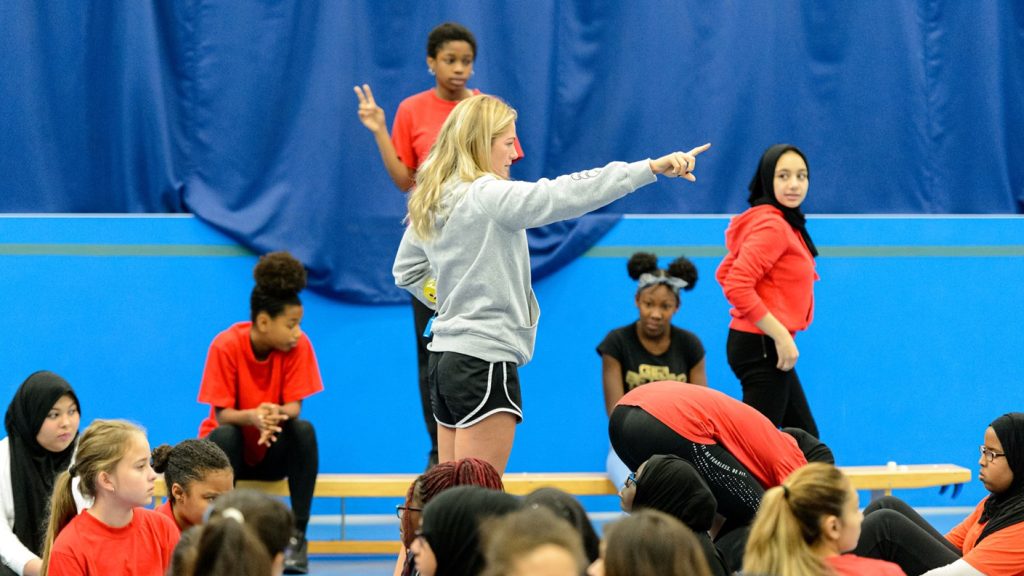Natasha Eason, Associate Director of Education at The Chartered Institute for the Management of Sport and Physical Activity (CIMSPA), considers the latest statistics which show almost a million young people are not in education employment or training.
“The number of young people in the UK who are not in education, employment, or training (NEET) is edging closer to the one million mark, and that’s a pretty alarming reality. It’s not just a statistic—it’s a sign of deeper challenges that we need to talk about. According to recent figures from the Office for National Statistics (ONS), an estimated 987,000 people aged 16 to 24 fell into this category between October and December 2024. That’s a staggering 13.4% of the UK’s youth population.
Even more concerning? The numbers are rising. Compared to the previous quarter, there’s been an increase of 41,000, and looking back a year, the figures have jumped by 110,000. This isn’t just about unemployment; it includes young people who aren’t training, studying, or even counted in the labour market at all.

So what’s going on?
There’s no single reason why NEET figures are climbing—it’s a mix of economic challenges, education gaps, mental health challenges, and social inequalities. Let’s take a deeper look:
The labour market is really tough
The economy is very challenging, and that’s hitting young job seekers hard. Many industries have changed the way that they work since the pandemic, and in some cases this impacts opportunities for new entrants to the jobs market making it tough to find stable jobs, especially for those without much work experience. On top of that, companies facing financial pressure aren’t always willing to invest in early career training, leaving young people with fewer options.
The skills gap problem
There’s a reported mismatch between what employers need and what young people are learning. Digital skills, problem-solving, and vocational expertise are in high demand, but many young people aren’t getting the training they need in these areas to secure jobs. Without access to high-quality apprenticeships and other courses, the gap just keeps growing.
Mental health matters
Anxiety, depression, and stress are rising among young people, making it even harder to stay engaged with work or education. Up to 34% of 18 – 24 year olds have experienced common mental health disorders. The pressure of exams, financial worries, and social isolation can all play a role in impacting engagement with training and employment. Without proper mental health support, re-entering learning or the labour market can feel like an impossible challenge.
Social and economic barriers
Young people from disadvantaged backgrounds are feeling the brunt of this crisis. If you don’t have financial backing, connections, or access to career advice, getting into training or work can be a major struggle. The playing field isn’t level, and for many, the barriers are just too high.
How sport and physical activity can help
The sport and physical activity sector isn’t just about fitness – it’s a gateway to careers, skills, and opportunities that can help tackle the NEET crisis head-on.
A foot in the door – Jobs in community coaching, fitness training, sports management, and active wellbeing offer real career paths, and many don’t require traditional academic qualifications.
Hands-on training – Apprenticeships in sports coaching, personal training, and sports development provide practical experience while allowing young people to earn money.
Developing life skills – Being involved in sport and physical activity teaches teamwork, leadership, discipline, and resilience -qualities that employers love and set young people up for a great future.
Community support – Many community sports initiatives help disadvantaged young people find purpose, build connections, and gain experience that leads to employment or further training.
Boosting mental wellbeing – Regular physical activity is proven to reduce stress and improve confidence, making it easier for young people to re-engage with work and education.
Positive life experiences and role models – Being part of sport and other physical activity introduces young people to positive influences, whether it’s a coach, teammate, or mentor. These role models can provide guidance, motivation, and inspiration, helping young people believe in their potential.
Building confidence and self-esteem – Success in physical activity – whether it’s improving a skill, winning a match, or simply feeling fitter – can translate into greater self-belief in other areas of life, including career aspirations.
Strong and diverse career pathways – The sport and physical activity sector isn’t just about roles that help people to get active or play sports. It encompasses areas like community development, sports science, journalism, IT, business management, and marketing. This diversity means there’s something for everyone, regardless of background or skill set.
What Needs to Happen?
Fixing this issue isn’t going to be easy, but there are real steps we can take:
- More training and apprenticeships
Expanding opportunities in sectors like sport and physical activity can help bridge the gap between education and employment. CIMSPA works across the sector to ensure that Apprenticeship Standards continue to meet the needs of employers. - Better careers support
Schools and colleges need to ensure that they are providing real-world careers information, advice and guidance that connects young people to sustainable and attractive job paths. This is why CIMSPA has created specific support resources for schools and colleges to help them to provide advice on opportunities in the sport and physical activity sector. - Investing in mental health
Without the right support, these challenges can lead to absenteeism, disengagement, and, in some cases, dropping out altogether. By prioritising mental health, schools, colleges, and employers can create environments where young people feel valued, supported, and able to thrive. This not only benefits individuals but also strengthens communities and the wider economy.
Investing in mental health support – whether through counselling services, mentoring programmes, or simply fostering open conversations – can make a significant difference in helping young people navigate challenges. When mental health is properly addressed, young people are more likely to develop resilience, build confidence, and stay motivated in their educational and career pathways. Employers also have a role to play by promoting workplace wellbeing initiatives and recognising the importance of mental health in productivity and job satisfaction. Ultimately, ensuring that young people receive the support they need will help them reach their full potential and contribute meaningfully to society. - Incentives for employers
Recruiting young people can bring new ideas and long-term benefits to businesses – but many employers are hesitant due to the costs and training involved. So, how can the government make it more attractive for businesses to take on young talent?
One of the most effective ways is through financial incentives. Offering tax relief or reduced National Insurance contributions for companies that hire young employees could make recruitment more affordable. Wage subsidies for apprenticeships and traineeships would also help businesses manage costs while giving young people valuable experience. Grants for structured training programmes could further ease the burden, ensuring that employers invest in skills development without worrying about expenses.
Beyond financial support, the government could strengthen links between businesses and education providers. More funding for industry-led mentoring schemes, internships, and work placements would give young people hands-on experience while reducing the need for employers to provide extensive initial training. Companies that actively support young talent could even benefit from business rate reductions or other perks. By making it easier—and more rewarding – for businesses to develop young workers, the government could help create a more skilled, engaged, and future-proof workforce. - Raising awareness about sport and physical activity careers
Many young people don’t realise just how many career paths exist in the sports sector – highlighting these options could encourage more to get involved. Through the sector’s Careers Hub, they can discover information on roles, opportunities and development pathways that align with their interests.
It’s time to act
When a young person is not in employment, education, or training (NEET), the long-term consequences can be far-reaching – not just for them but for society as a whole. On a personal level, prolonged disengagement can lead to a decline in skills, confidence, and motivation, making it much harder to re-enter the workforce or education later on. Without qualifications or work experience, career prospects become limited, often resulting in low-paid, unstable jobs with little opportunity for progression. Financial instability can follow, increasing the risk of poverty, housing insecurity, and long-term reliance on welfare support. There’s also a significant impact on mental and physical health, as the stress of unemployment and social isolation can lead to anxiety, depression, and other health issues.
The wider societal impact is equally concerning. A high number of young people not in education, employment or training places a strain on public services, with increased costs for welfare, healthcare, and intervention programmes. It also affects the economy, as skill shortages and a less productive workforce can slow growth and innovation. Additionally, disengaged young people are more vulnerable to crime and antisocial behaviour, which can lead to further challenges for communities. Addressing the NEET issue through targeted support, such as apprenticeships, vocational training, and personalised career guidance, is essential to breaking this cycle. By investing in young people’s futures, we not only help them achieve their potential but also strengthen society as a whole.
If we don’t act now, we risk leaving an entire generation behind. But with the right support, training, and career pathways, particularly in sectors like sport and physical activity, we can turn things around. It’s time to invest in young people and give them the opportunities they deserve – because they’re the future, and they need our help now more than ever.”
For more on how the sport and physical activity sector is working collaboratively to create opportunities for people not in education, employment or training take a look at our [recent video here](https://www.cimspa.co.uk/news-blog/news/2025/how-can-our-sector-support-those-who-are-neet-back-into-learning-or-into-work/).
Natasha Eason is responsible for educational development for the sport and physical activity sector’s professional body. Natasha leads CIMSPA’s work to ensure that learning and education provision is high-quality and meets the sector’s professional standards. Natasha was previously a Lecturer in Sport and Fitness at a further education college.
